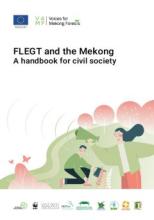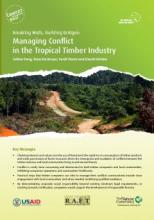/ library resources
Showing items 82 through 90 of 3692.Recognising that trade drives illegal logging and that poor governance enables it, the European Union (EU) developed the Forest Law Enforcement, Governance and Trade (FLEGT) Action Plan.
Due to growing environmentally and socially aware markets on a global level, as well as on a regional level, and with more recent gains for democracy in the region, companies have to ensure their operations are socially and environmentally acceptable.
The principle that indigenous peoples and local communities have a right to give or withhold their Free, Prior, and Informed Consent (FPIC) to developments affecting their resources is not new. However, experience using FPIC in REDD+ implementation is still limited in the Asia-Pacific region.
Community forestry offers a tried and true model for approaching national Safeguard Information Systems (SIS) under REDD+. RECOFTC agrees with the global consensus that REDD+ SIS should be based upon existing, equitable and participatory systems.
This is the final report of the “Grassroots Capacity Building for REDD+” project in the Asia-Pacific region.
A national seminar on Gender, Forestry, and REDD+ was held on 27 July, 2012 at the Himawari Hotel in Phnom Penh.
This annual progress report highlights key achievements and lessons learned of the “Grassroots Capacity Building for REDD+” project in the Asia‐Pacific region, between August 2011 and July 2012.
Hosted in Hanoi, Vietnam, from 18 to 20 August 2009, the First Regional People and Forests Forum on Carbon Financing and Community Forestry brought together more than 80 people from 12 countries, including key government, civil society, private sector, and international organization participants.
RECOFTC and partners recently conducted a national-level expert panel discussion in Myanmar on gender mainstreaming in national forestry and REDD+ initiatives.
Pagination
Land Library Search
Through our robust search engine, you can search for any item of the over 73,000 highly curated resources in the Land Library.
If you would like to find an overview of what is possible, feel free to peruse the Search Guide.









